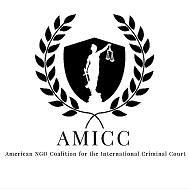 |
| Luis Moreno-Ocampo in the UN Security Council. UN Photo by JC McIlwain. |
By Stephanie Kammer
On Tuesday Luis Moreno-Ocampo made his final presentation in his capacity as Prosecutor for the ICC, to the UN Security Council on the situation in Darfur, Sudan. Mr. Moreno-Ocampo called on the Security Council to support the work of the Court in Darfur by ensuring Sudan's compliance with the ICC's arrest warrants against Omar Al Bashir (President of the Republic of Sudan), Ali Kushayb (alleged leader of the Militia/Janjaweed), Ahmad Harun (former Minister of State for the Interior of the Government of Sudan), and Abdel Raheem Hussein (Minister of National Defense).
The Security Council referred the
Darfur situation to the ICC in 2005 under Resolution 1593. Although Sudan is
not a party to the Court’s Rome Statute, the Court has jurisdiction over crimes
committed in Darfur under Article 13(b) of the Statute. Article 13(b) allows the
Security Council to refer situations to the ICC when the Council is acting under
Chapter VII of the UN Charter to address threats to international peace and
security.
Mr. Moreno-Ocampo began by
describing the difficulty of conducting an investigation in Darfur. The cases
in Darfur involve thousands of alleged crimes committed by different parties
over a vast territory. The Office of the Prosecutor needed to collect the
testimonies of hundreds of witnesses and victims around the world. Concern for
the safety of witnesses and victims further complicated the process of
gathering evidence.
Regarding Sudan’s previous challenge
to the value of the evidence collected, the Prosecutor said that the matter was for ICC Judges to assess. He said that the Judges have evaluated the evidence provided
by the Office of the Prosecutor and have concluded that the government of
Sudan's forces committed war crimes and crimes against humanity by means of a
strategy adopted at the highest levels of government.
Mr.
Moreno-Ocampo emphasized that it is the primary responsibility of the Sudanese
Government to execute the arrest warrants issued by the ICC:
"The Court
fulfilled its judicial mandate. The evidence collected uncovered the
functioning of the State apparatus used to commit genocide, crimes against
humanity and war crimes. Those who bear the greatest responsibility have been
indicted. The current challenge is their arrest. In accordance with Security
Council Resolution 1593, the Government of the Sudan has the legal obligation
to implement the arrest warrants. But President Al Bashir is taking advantage
of his position of power to continue with his strategy and to ensure his own
impunity and the impunity of those who follow his instructions."
Mr. Moreno-Ocampo
concluded by reiterating the critical role of the execution of the arrest
warrants in international peace and justice. He argued that the failure of
states to arrest and surrender those subject to ICC warrants is a direct
challenge to the Security Council's authority.
In response to the Prosecutor’s
presentation, Ambassador Daffa-Alla Elhag Ali Osman, Permanent Representative
of Sudan to the United Nations, made a lengthy statement decrying the Court as
a political entity, subject to the whims of the Prosecutor. Ambassador Osman said
that the Prosecutor's report contained misinformation and that there had been
positive developments in Darfur as a result of the Doha Agreement. Ambassador
Osman then quoted former Secretary of State Condoleezza Rice from her memoir about her time in the Bush Administration, expressing that Administration's concern
for the ICC as a potential threat to US sovereignty. However, it is important
to note that Secretary Rice made statements in 2005 and 2008 supporting the ICC
and the Security Council referral of the Darfur situation. In
the paragraph immediately following the section of her memoir quoted by Ambassador
Osman, Secretary Rice writes:
"Yet when the genocide issue of Darfur reached the Security Council, I did not want the United States to let the perpetrators off the hook just to make an ideological point about the structure of the court or the Rome statute. After much back-and-forth and strong dissent from John Bolton, I talked to the President and we agreed that the United States would abstain from voting on, not veto, the resolution. Darfur was referred to the ICC on March 31, 2005."
"Yet when the genocide issue of Darfur reached the Security Council, I did not want the United States to let the perpetrators off the hook just to make an ideological point about the structure of the court or the Rome statute. After much back-and-forth and strong dissent from John Bolton, I talked to the President and we agreed that the United States would abstain from voting on, not veto, the resolution. Darfur was referred to the ICC on March 31, 2005."
Following Sudan’s reply, other
members of the Council were invited to give statements. Many members were
supportive of the ICC, in particular, the United States, which also stressed
the responsibility of the Sudanese government to comply with Resolution 1593.
Ambassador Jeffrey DeLaurentis expressed US concern with the lack of progress
on accountability initiatives provided for in the Doha Agreement and the
continuing violence in the Darfur region, including sexual and gender-based
violent crimes.
Notably, at the close of the meeting
when invited to respond to the statements of all the parties, Mr. Moreno-Ocampo
stated that it was his duty as Prosecutor to inform the Council and the parties
that under Article 25(3)(d) of the Rome Statue, denying crimes could be
considered part of the crimes themselves, and that the Office of the Prosecutor
has an obligation to investigate anyone suspected of this kind of
activity. Mr. Moreno-Ocampo went on to
say that the Office would investigate whether Ambassador Osman's actions at the
meeting could be considered a contribution to a group of perpetrators acting
with a common purpose.
Click here to view the video of the Security Council meeting.
Click here to view the video of the Security Council meeting.


No comments:
Post a Comment